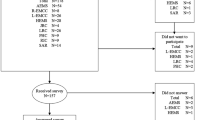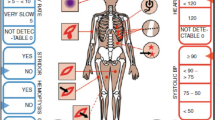Abstract
Introduction
Mass Casualty Incidents (MCI) may occur during Mass Gathering Events (MGE). A failure to prepare and train the health care system for potential MCI, can cause chaos and delays in the response, leading to an increased morbidity and mortality. Education and training of staff are crucial for preparedness. In Italy, hospital Emergency Plans for Massive Influx of Injured (in Italian designated with the acronym PEMAF) are mandatory since the ‘90’s. However, when available, they are usually poorly known by the staff, rarely reviewed and validated. In 2014, Matera, a city in Southern Italy, was designated as the European Capital of Culture for 2019. As a result, we took this opportunity to revise the “Madonna delle Grazie” PEMAF and to start a program for increasing the awareness of the plan among the medical staff and provide specific training for MCI management.
Material & methods
The PEMAF was reviewed through simulations that involved the entire staff. A partnership with the International Association for Medical Response to Major Incidents & Disasters (MRMI) led to the support of experts and to the organization of residential courses based on the MAss Casualty SIMulation tool (MACSIM®). In total, six residential educational events of MACSIM-PEMAF were organized. Individual capacity was tested before and after the education through self-administered semi-quantitative questionnaires.
Results
All the available resources were mapped and the functional areas identified. Alert, coordination and command sequences were defined. The communication network was improved. Documentation and registration systems were developed. Standard operational procedures (action cards) were created for the key positions. The knowledge and capacity to function in active roles during a MCI was improved among the participants in the educational program.
Conclusions
MGE are great opportunities for the development of the hosting community but also represent an increased risk of MCI. Preparedness is mandatory for health care systems. The educational format MACSIM-PEMAF seems to be adequate to review and improve the existing plans and transfer specific skills to attendants.



Similar content being viewed by others
References
Memish ZA, Steffen R, White P, Dar O, Azhar EI, Sharma A, Zumla A. Mass gatherings medicine: public health issues arising from mass gathering religious and sporting events. The Lancet. 2019;393(10185):2073–84.
Memish ZA, Zumla A, McCloskey B, Heymann D, Al Rabeeah AA, Barbeschi M, Horton R. Mass gatherings medicine: international cooperation and progress. The Lancet. 2014;383(9934):2030–2.
Gowing JR, Walker KN, Elmer SL, Cummings EA. Disaster preparedness among health professionals and support staff: what is effective? An integrative literature review. Prehosp Disaster Med. 2017;32(3):321.
Lennquist S. Education and training in disaster medicine. Scand J Surg. 2005;94(4):300–10.
Parker CL, Barnett DJ, Fews AL, Blodgett D, Links JM. The road map to preparedness: a competency-based approach to all-hazards emergency readiness training for the public health workforce. Public Health Rep. 2005;120(5):504–14.
Hick JL, Barbera JA, Kelen GD. Refining surge capacity: conventional, contingency, and crisis capacity. Disaster Med Public Health Prep. 2009;3(S1):S59–67.
Linee Guida N°54 (1998) Presidenza del Consiglio dei Ministri, Dipartimento della protezione civile. Servizio Emergenza Sanitaria, “Pianificazione dell’emergenza intraospedaliera a fronte di una maxi-emergenza.
D.P.R. 27/3/1992 “Atto di indirizzo e coordinamento alle Regioni per la determinazione dei livelli di assistenza sanitaria in emergenza”.
Accordo tra Ministero della Salute, Regioni e Province Autonome di Trento e Bolzano per l’organizzazione e l’assistenza sanitaria, 5 agosto 2014 Conferenza Unificata (Rep. Atti n. 91 del 5 agosto 2014).
Paganini M, Borrelli F, Cattani J, Ragazzoni L, Djalali A, Carenzo L, Ingrassia PL. Assessment of disaster preparedness among emergency departments in Italian hospitals: a cautious warning for disaster risk reduction and management capacity. Scand J Trauma Resusc Emerg Med. 2016;24(1):101.
https://www.oltrelartematera.it/en/water-collection-palombaro-del-caveoso/.
SICUT, (2017), “Indicazioni per un Piano di risposta ospedaliera ad una Maxi-emergenza di carattere traumatico (in Italian)”, Società Italiana di Chirurgia d’Urgenza e del Trauma. Available at: http://www.sicut.net/wp-content/uploads/2017/06/PEMAF-SICUT.pdf. Assessed on 01.01.2021
Vale LMRP, Rui Faria N, Freitas DJ, et al. Implementation of the Medical Response to Major Incidents Course in Madeira. Portugal Clin Edu Med Sim. 2020;3(1):15–22. https://doi.org/10.17219/cems/13165.
Montán KL, Hreckovski B, Dobson B, Örtenwall P, Montan C, Khorram-Manesh A, Lennquist S. Development and evaluation of a new simulation model for interactive training of the medical response to major incidents and disasters. Eur J Trauma Emerg Surg. 2014;40(4):429–43.
Montán KL, Örtenwall P, Lennquist S. Assessment of the accuracy of the Medical Response to Major Incidents (MRMI) course for interactive training of the response to major incidents and disasters. Am J Disaster Med. 2015;10(2):93–107.
Faccincani, R. & Stucchi, R & Carlucci, M & al. (2020). Evaluation of Interaction between Emergency Medical System and Hospital Network during a Train Derailment. Disaster Medicine and Public Health Preparedness. (in press)
McNamara G, Joyce P, O’Hara J. Evaluation of adult education and training programs. Elsevier, NY: Internat EncyclEduc; 2010.
Ross JA. The reliability, validity, and utility of self-assessment. Pract Assess Res Eval. 2006;11(1):10.
Castoldi L, Greco M, Carlucci M, Montán KL, Faccincani R. Mass Casualty Incident (MCI) training in a metropolitan university hospital: short-term experience with MAss Casualty SIMulation system MACSIM®. Eur J Trauma Emerg Surg. 2020. https://doi.org/10.1007/s00068-020-01541-8.
Acknowledgements
The authors thank Hospital Medical Direction for having believed in the project.
Author information
Authors and Affiliations
Contributions
All authors read and approved the final manuscript. All authors contributed substantially to its revision.
Corresponding author
Ethics declarations
Conflict of interest
The authors declare that they have no competing interests.
Additional information
The current study’s abstract has been published in the official abstract publication of the European Congress of Trauma and Emergency Surgery 2020 (ECTES Abstracts 2020) of the European Society for Trauma and Emergency Surgery on European Journal of Trauma Emergency Surgery 46, 3–316 (2020).
Supplementary Information
Below is the link to the electronic supplementary material.
Rights and permissions
About this article
Cite this article
Campanale, E.R., Maragno, M., Annese, G. et al. Hospital preparedness for mass gathering events and mass casualty incidents in Matera, Italy, European Capital of Culture 2019. Eur J Trauma Emerg Surg 48, 3831–3836 (2022). https://doi.org/10.1007/s00068-021-01775-0
Received:
Accepted:
Published:
Issue Date:
DOI: https://doi.org/10.1007/s00068-021-01775-0




